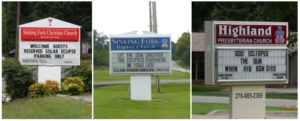By Eddie Pipkin
August 26, 2017
Last week I was lucky enough to stay with friends in North Georgia to catch the total eclipse. It was, as advertised, a once-in-a-lifetime spectacular. Beyond the personal experience of this natural mega-event, I was also interested in the news coverage of the ways that individual communities responded with gatherings and celebrations. I had my radar attuned for responses of local churches, of course. Watching the ways (and non-ways) that congregations interacted with this showstopper, as well as other, more troubling, recent events provided insights into opportunities that ministries have to be relevant within their communities.
Some congregations within the path of eclipse totality embraced the possibilities with enthusiasm, offering viewing parties, distributing eclipse glasses, or providing refreshments for the masses.  Some in popular viewing locations cashed in by selling prime parking spots as an impromptu fund raiser. Some churches laid low on the day of the event itself, but welcomed visitors with specially-themed worship services on Sunday, the day before. Many gave it a perfunctory nod with witty signs out front or clever sermon titles that used some aspect of the eclipse as a talking point or illustration. Some congregations just hunkered down, viewing the whole thing as a disruption. (As one pastor was quoted: “We’re just trying to survive the whole thing and get back to our regular routine.”)
Some in popular viewing locations cashed in by selling prime parking spots as an impromptu fund raiser. Some churches laid low on the day of the event itself, but welcomed visitors with specially-themed worship services on Sunday, the day before. Many gave it a perfunctory nod with witty signs out front or clever sermon titles that used some aspect of the eclipse as a talking point or illustration. Some congregations just hunkered down, viewing the whole thing as a disruption. (As one pastor was quoted: “We’re just trying to survive the whole thing and get back to our regular routine.”)
These varying strategies can communicate a lot about our philosophies of engaging our communities, our zeal for seizing creative opportunities for ministry, our flexibility in adjusting our schedules and plans to embrace those opportunities, and our openness to outside the box thinking. In an in-depth exploration of how some Utah churches were taking advantage of eclipse mania, reporter Kelsey Dallas shared these quotes:
Eclipse-related events “send the message that the church is in tune with what’s going on in the community. People see that they’re being friendly,” [ Scott] McConnell [of LifeWay Research] said.
Soft evangelism, or the type of outreach that flows from seemingly nonreligious events, might seem opportunistic, said Jeff Zweerink, an astrophysicist who serves as executive director of online learning at Reasons to Believe, an organization that seeks to link religious teachings with scientific research. But Jesus himself found success going where the people are, he added.
“Look at how Jesus interacted with others,” Zweerink said. “That’s my advice to Christians. There’s an event here that people are interested and engaged in and there are some obvious connections to be made to the Christian faith.”
The hype and legitimate interest surrounding The Great American Eclipse is just one example of how we can be sensitive to the zeitgeist (the cultural and current events topics of the moment). Whatever the subjects of water cooler conversation and social media posts, we have an opportunity to respond as ministries to the issues and ideas that are actively on people’s minds. This is a primary opportunity for ministries that want to be relevant for their congregations and communities. People don’t want their gospel to be locked in a glass display case, separated as a holy artifact from the real world. They want their gospel to be an active part of the ongoing conversation. Our unique opportunity is share the gospel’s perspective on the issues of the day: to extend an authentic conversation about how faith interacts with events cosmic and parochial.
Sometimes these events are whimsical and celebratory, such as eclipse fervor. Sometimes they are troubling and national in scope, as witnessed by the struggle of local congregations to process the recent events in Charlottesville, Virginia. If we are to be relevant, if we are to be authentic to those who are wrestling with ways to integrate their faith lives with the events happening around them, we must be thoughtful in our responses. These are the affairs that consume our news feeds and demand our attention. How does the gospel give us the tools to understand and navigate these shared moments? We need to give people spiritual context, ways to process their anxieties, and ways to respond in love and hope. The Church is uniquely positioned to do these things, but the church (the local congregation) can struggle in defining exactly how that happens. When we get it right, however, we are a beacon of comfort to those who desperately need it and a place known as an outlet for deeper conversation and responsive action that heals and nurtures our communities.
We had a tragic reminder of this community role last week in the Orlando area (the locality from which this blog originates). Two City of Kissimmee police officers were killed, and the community united together in its grief and sought ways to process this horrific incident, as well as ways to more deeply understand and respond to the related social issues (mental health, crime-ridden neighborhoods, violence, the dangers facing first-responders). There had been plenty in the news nationally to react to in the week before these two public servants lost their lives, but suddenly the news was disturbingly local. Our ministries inhabit a privileged position to offer people a place to process their grief, unite in prayer, and struggle together with difficult issues. May we rise to the challenge.
Ask these questions in thinking about your ministry’s ability to respond with relevance:
- Are you looking ahead on the calendar at upcoming events, local and national, to see how you might integrate enthusiasm for these events into the planning for your ministry?
- As part of your regular planning, do you actively seek ways to provide context and deeper discussion for issues in the news (particularly troubling issues and events)?
- Do you look for ways to give ministry participants an outlet for positive response when national and local issues are dominant topics of conversation?
- Are you willing to jettison plans (for instance, in worship) when something comes up, so that you might respond more fully to tragedies and challenges of the moment?
- Do you encourage all ministry leaders to think creatively about integrating current news and issues into their regular ministry routines?
In what ways have your ministries responded to celebrate national events and to help your communities grieve over local tragedies and explore challenging issues together? Share your stories. And for more information on how to build stronger, more relevant faith communities, take a look at our Connect! materials and the training resources offered through EMC3 coaching ministries.







Leave A Comment